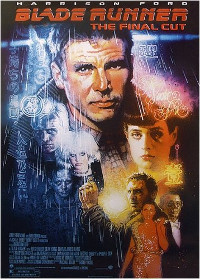 In a dark and depressing Los Angeles future, former cop Rick Deckard is a “blade runner.” These blade runners have one assignment, to terminate “replicants”, advanced androids that look like real humans. Deckard’s one last assignment is to terminate a group of replicants that committed a bloody mutiny in an off-world colony and now hide in the city. While locating the replicants, Deckard meets Rachel, an advanced replicant, and makes him question his own identity and motives in this dark world.
In a dark and depressing Los Angeles future, former cop Rick Deckard is a “blade runner.” These blade runners have one assignment, to terminate “replicants”, advanced androids that look like real humans. Deckard’s one last assignment is to terminate a group of replicants that committed a bloody mutiny in an off-world colony and now hide in the city. While locating the replicants, Deckard meets Rachel, an advanced replicant, and makes him question his own identity and motives in this dark world.
Back in my hometown during college, I frequented a local video-renting shop and usually “borrowed” science fiction films. Because of the Internet, my interest in science fiction grew, and I discovered that some of those films were adapted from science fiction novels. One of those authors with works adapted into films I have already watched is Philip K. Dick. I have already watched Total Recall (1990), Minority Report (2002), Paycheck (2003), and The Adjustment Bureau (2011). Surprisingly, I haven’t watched the first one: Blade Runner (1982). Since the sequel Blade Runner 2049 (2017) is on its second week (or probably third) run in Philippine cinemas, I have to rectify that.
Wikipedia summary:
Blade Runner is a 1982 American neo-noir science fiction film directed by Ridley Scott and starring Harrison Ford, Rutger Hauer, Sean Young, and Edward James Olmos. The script was written by Hampton Fancher and David Peoples. It is a loose adaptation of the 1968 novel Do Androids Dream of Electric Sheep? by Philip K. Dick.
I chucked when it was revealed that this film is set in Los Angeles in 2019. There is an announcement about living in off-world colonies, and there are flying cars. It will not be possible to attain those within two years. To make this acceptable in my head, I set this move in a parallel world instead.

The movie’s overall feel reminded me of Dark City (1998) and Minority Report (2002). I just discovered this is called tech noir, a blend of film noir and futuristic sci-fi.
As this is my first viewing of the film, I don’t have much opinion. Another viewing might help in the near future.
A line from Rachel, the advanced replicant, stayed with me:
That Voight-Kampf test of yours. Have you ever tried to take that test yourself?
This line suggests that we might never be sure if someone is replicant.
Quick rating: I like it. (3 out of 5 stars)
I also put Do Androids Dream of Electric Sheep? on my reading pile.
What’s next: I hope to catch Blade Runner 2049 (2017) in the cinema.
: https://promdigeek.blog/2017/10/22/thoughts-on-blade-runner-1982/
